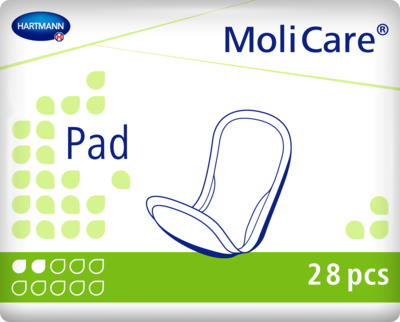Incontinence Advice
Living with double incontinence

What is Double Incontinence?
The term ‘double incontinence’ refers to faecal and urinary incontinence occurring together. However, most people do not realise that there are multiple types of incontinence, each with different symptoms and causes. Understanding the kind of incontinence someone is suffering from is the first step in helping address the problem.
What is Double Incontinence?
- Urge incontinence
Urge incontinence is often caused by nerve or muscle damage but can also be caused by medical conditions. A group of symptoms called ‘overactive bladder’ can often result in urge incontinence, when the bladder muscle is more active than normal. It manifests as a sudden, intense urge to urinate, and can lead to accidents as the individual rushes to the toilet. Often, when someone experiences urge incontinence, they do not recognise the urge to go to the toilet until it is too late.
- Stress incontinence
Stress incontinence occurs when the bladder experiences sudden pressure. Laughing, sneezing, and lifting heavy objects can all cause urine leakage. Stress incontinence is usually caused by a weak pelvic floor muscle or damaged sphincter muscle in the urethra, allowing urine to leak out. Some people also experience mixed incontinence, a combination of both stress and urge incontinence.
- Overflow incontinence
Overflow incontinence occurs when the bladder is filled with too much urine, and it overflows. It can also be referred to as Chronic Urinary Retention. For a variety of reasons, the bladder nerves do not signal to the brain that it needs to be emptied or cannot be emptied fully. It can take a long time to completely empty the bladder, and it therefore becomes overfilled and leaks to relieve pressure.
- Functional incontinence
Functional incontinence can occur when a person has difficulty with one or more of the steps required to use the toilet. For example, if someone has limited mobility and cannot get to the toilet in time or if someone is confused and doesn’t know where to find the toilet. Functional incontinence can also occur if a person struggles to remove their clothing due to limited dexterity.
- Bowel Incontinence
Bowel incontinence occurs when a person cannot control their bowel movements. This form of incontinence can occur after an injury to the nerves, or after an illness such as inflammatory bowel disease or inflammatory bowel syndrome. However a common cause of bowel incontinence is severe or prolonged constipation or diarrhoea. For many sufferers, the nerve signals from the rectum do not reach the brain in time, causing a person to defecate before they can reach the toilet.
- Double Incontinence
When a person suffers from bowel incontinence concurrently with urinary incontinence, the condition is referred to as double incontinence, or combined incontinence. This is one of the most exhaustive incontinence and can severely impact a person’s physical and mental wellbeing.
What Are The Symptoms Of Double Incontinence?
Double incontinence has a variety of symptoms, including:
- You feel sudden and intense urges to go to the toilet, and you can’t control them.
- You soil yourself without feeling the need to go to the toilet.
- You leak faeces when you pass wind.
- You have stopped socialising and/or found your working life affected.
- You feel anxious or depressed about your symptoms.
- You suffer from bloating, constipation, diarrhea, or excessive passing of wind.
- You experience skin rashes or irritation from the prolonged presence of urine or faeces.
- Your quality of sleep is poor due to frequent trips to the toilet in the night.
What Causes Double Incontinence?
Double incontinence can have many different causes. It is important to note that it is not a disease, but it’s a symptom of a bigger problem that can be related to physical problems, lifestyle factors, or other underlying medical conditions. These underlying issues will need to be addressed before the double incontinence can be treated.
Remember, the factors leading to a loss of bladder control and faecal incontinence might not indicate a serious problem. There are many simple lifestyle changes that can help ease the problem.
Double incontinence is usually caused by damage to the network of muscles and nerves that control urination and bowel movements. This damage can be caused by straining during bowel movements, medical conditions (such as multiple sclerosis) and physical problems and is often reversible. Connective tissue diseases could be the underlying cause of double incontinence. Crossed reflexes between the pelvic floor, urethra, and bladder could explain the problem, as can damage to the muscles and sphincters.
The following factors have all been linked to the occurrence of double incontinence:
- Age – Double incontinence can occur at any age, but it is more common in people over the age of 65.
- Nerve damage – Conditions and illnesses that cause nerve damage have been shown to cause double incontinence. Diabetes and multiple sclerosis are both common causes.
- Gender – Women suffer from double incontinence more often than men, mainly due to the fact that faecal incontinence can sometimes be a complication of childbirth.
- Weight – People who have a BMI (body mass index) above 30 are classified as obese, and they are at a much higher risk of suffering from all kinds of incontinence
- Dementia – People suffering with dementia late-stage Alzheimer’s disease are at a higher risk for double incontinence.
- Physical disability – Different physical disabilities can make it difficult for a person to get to the toilet on time, especially if they are confined to a wheelchair or a bed.
- A Stroke - Many people who have suffered a stroke also develop incontinence. This is due to the weakening of the muscles and nerves that control the bladder and the bowel. The most common type of incontinence for stroke patients is overflow incontinence, causing a slow leak out of the urethra.
Incontinence Product Finder
Selecting the right products is key in ensuring security and discretion. If you’re not quite sure what you need, try our product finder. It’ll ask you a few questions about your needs and then provide a list of recommended products that may help you.
Find Product Incontinence Product FinderHow To Manage Double Incontinence?
Double incontinence is not always the sign of a serious problem or disease. In many cases, double incontinence can be successfully managed with simple lifestyle changes. The most important thing to do when trying to manage double incontinence is to schedule a visit to your doctor or local specialist continence service. They can help you come up with a plan to manage and treat your problem.
Here are some lifestyle changes and products you can utilise to manage double incontinence.
- See your doctor or local specialist continence service – Book an appointment with your GP, and speak with them openly about your symptoms – there is no need to be embarrassed
- Limit caffeine and alcohol – Reduce the amount of caffeine and alcohol you consume, as these can be diuretics for your bladder and stimulate your bowel
- Check your medications – Ask your GP or chemist about the affects that certain medications and vitamins can have on your bladder and bowel
- Incontinence products – Using incontinence pads and other incontinence products can help people to carry on with their daily routine.
- Get a Radar Key – Inquire about acquiring a Radar key so that you can easily access disabled public toilets in your area when you are out
- Change your diet – Making changes to your diet, including eating more foods high in fibre, and avoiding a sweetener called sorbitol
- Do pelvic floor exercises – Undertake pelvic floor exercises at least twice a day in order to tone and strengthen your muscles and sphincters
- Surgery is a last resort – Surgeries to strengthen your pelvic floor and rectal muscles can be a last resort in the most severe cases.
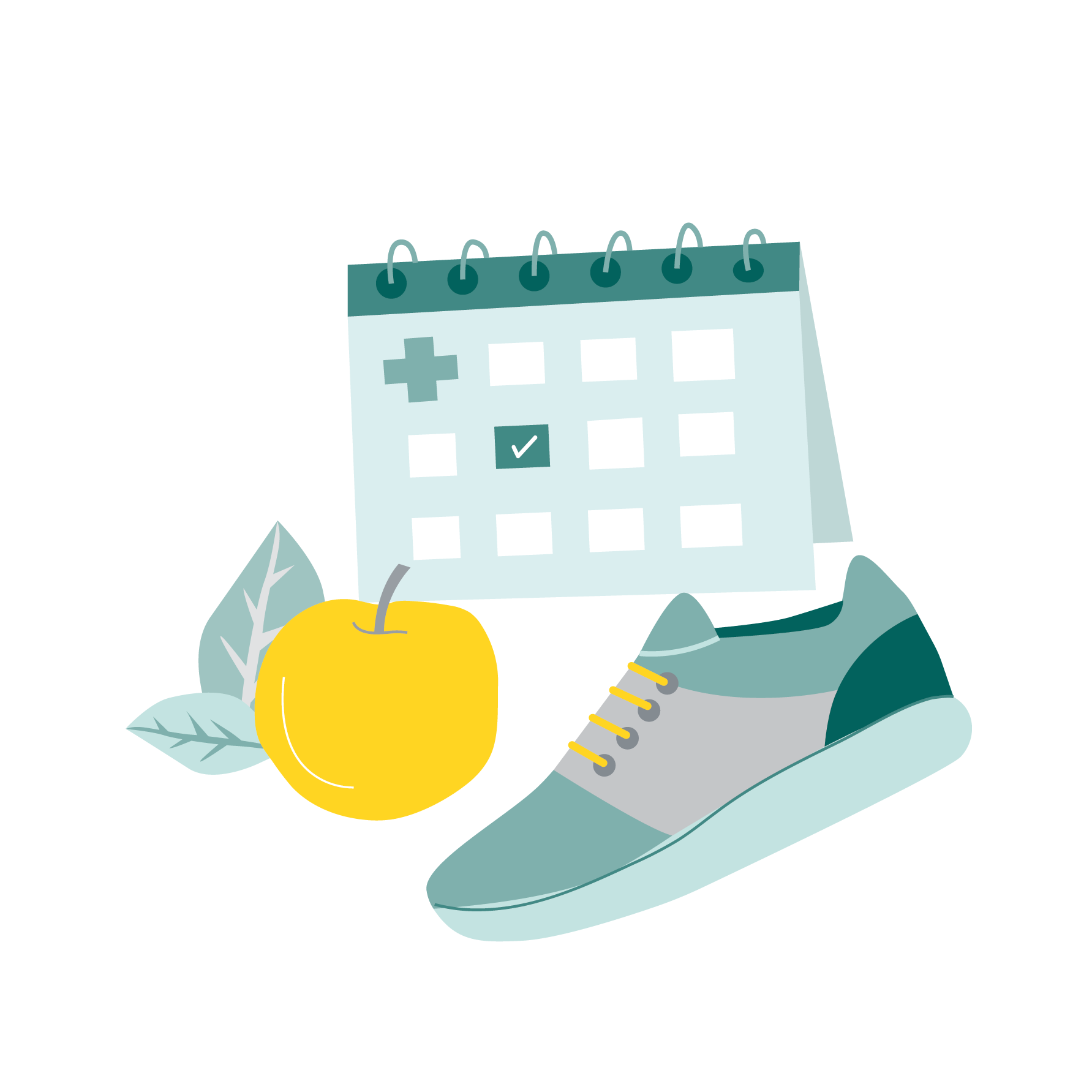
How Can You Avoid Double Incontinence?
Ultimately, the best way to treat double incontinence is to prevent it in the first place. Here are some simple ways that can help you to avoid incontinence before it ever starts:
- Strengthen your pelvic floor – Practice pelvic floor exercises throughout your life, so that your pelvic floor muscles are strong and in good condition as you age, or in the event of illness
- Reduce episodes of constipation – Ensure that your diet is rich in high-fibre food so that you can go to the toilet without straining
- Don’t strain when going to the toilet or urinating – Straining can put real pressure on the muscles , so make sure you don’t strain too much when using the toilet
- Reduce your weight – Having a high BMI can lead to instances of incontinence, and put you at risk for many other illnesses
- Control diarrhoea – Treating or preventing the causes of diarrhoea, including food intolerances and intestinal infections, can help you prevent double incontinence
- Quit smoking – Smoking can cause coughing, which can weaken the muscles in your bladder and bowel
- Drink 6-8 glasses of fluid per day – Ensure that you are well hydrated by drinking 6 to 8 glasses of water, juice, or herbal tea each day.
Double Incontinence Doesn’t Have To Ruin Your Life
By addressing the causes of double incontinence, using continence products, and making lifestyle changes, you can prevent and treat the problem. While you might feel embarrassed or anxious about the problem, remember that your GP or Continence Advisor has seen this before, and they are equipped to help. You are not alone – and you can overcome or manage double incontinence.
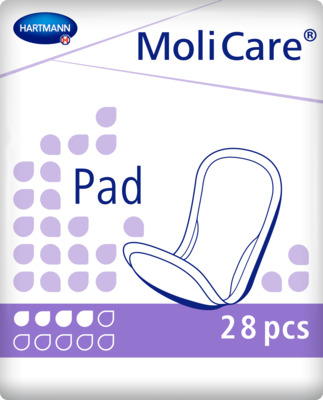
MoliCare Pad 4 Drops
<h2>Handy MoliCare Pad 4 Drops to Carry on the Go</h2> <p>Our MoliCare® Pad 4 Drops are an essential product for those experiencing slight incontinence, allowing you to regain control and live your busy and active life without the interference of bladder weakness. Designed for both men and women, this pad for men and women offers exceptional dryness and protection, ensuring your comfort and confidence.</p> <h2>‘Barely There’ Reassurance and Reliability</h2> <p>The MoliCare® Pad 4 Drops are slimline, discreet, and adjusted to fit your body seamlessly. It fixes securely inside your underwear, providing a ‘barely there’ comfort feel. With its soft and skin-kind fabric, along with a wide adhesive fixing strip on the backsheet, you can go about your day with the assurance of being protected against leakages.</p> <p>The absorbent core effectively prevents your skin from becoming too moist, while the elastic anti-leak edging adds an extra layer of security and peace of mind. Say goodbye to any worries about odours, as the MoliCare® Pad 4 Drops also neutralises odours to keep you fresh and confident throughout the day. Don't let incontinence hold you back from living life to the fullest.</p> <p>Ordering your MoliCare® Pad 4 Drops is hassle-free, as we offer fast and discreet delivery direct to your door. With our price match promise, you can trust that you're getting the best value for your money. Plus, enjoy free delivery on all orders over £40.</p> <p>If you need assistance in finding the perfect incontinence product for your needs, our friendly customer care team is here to help. Don't hesitate to reach out to us at 0800 028 9470. Take control of your life with the reliable protection and comfort of the MoliCare® Pad, alongside other <a href="https://www.hartmanndirect.co.uk/incontinence-products/incontinence-pads" style="color:#0563c1; text-decoration:underline">incontinence pads</a>.</p> <p> </p>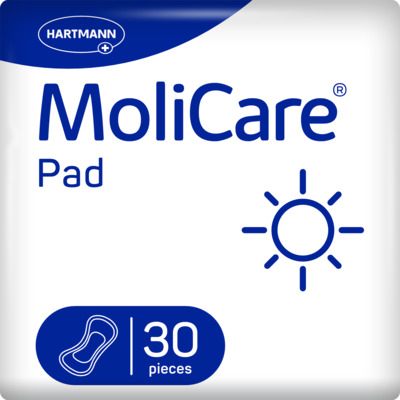
MoliCare Pads for Day
<h3>Incontinence pads for protection during the day </h3> <p>Even slight bladder weakness can be a burden in everyday life. There is a simple and affordable solution for this: MoliCare® Pad Day delivers discreet, reliable protection that helps you manage life’s daily challenges. </p> <p>The highly absorbent core inside the incontinence pads quickly locks away urine to ensure a pleasantly dry feeling on the skin. At the same time, it neutralises unpleasant odours. </p> <p>MoliCare® Pad Day are designed for discreet protection during the day. You can recognise the daytime incontinence product by the sun symbol on the packaging. They complement MoliCare® Pad Night incontinence pads which provide reliable protection at night. </p> <h3>Who is MoliCare® Pad Day suitable for? </h3> <p>MoliCare® Pad Day incontinence pads are suitable for people with mild bladder weakness. They leak anywhere from a few drops to 100 ml of urine between visits to the toilet. </p> <p>Incontinence pads are suitable for active women and men users whose mobility is not restricted. They can go to the toilet independently and without assistance. </p> <h3>Cheap incontinence products: comfortable, discreet protection </h3> <p>The incontinence pads have a highly absorbent core and odour control to keep you feeling fresh and comfortable. Thin and flexible, MoliCare® Pad Day are designed to be discreet, invisible under your clothing. Thanks to the wide adhesive strip, they remain securely in place even during sport. The incontinence pads are made from soft, breathable material so you feel comfortable all day. </p> <p>You usually need no more than two MoliCare® Pad Day incontinence pads during the day and one MoliCare® Pad Night incontinence pad for undisturbed sleep. This gives you a low cost yet high-quality round-the-clock supply of incontinence pads from HARTMANN. </p> <h3>We are HARTMANN </h3> <p>MoliCare® is HARTMANN’s extensive range of continence care. For over 40 years, we have been developing effective, reliable products that help people manage the challenges of living with incontinence. Our aim is to provide the right solution for every need. </p>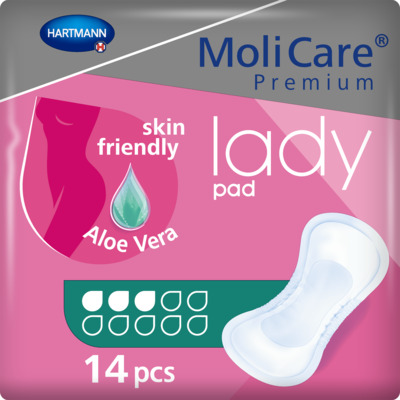
MoliCare® Premium Lady Pad 3 Drops
<h2>Lightweight Incontinence Solutions</h2> <p>The MoliCare® Premium Lady Pad 3 Drops is the perfect solution for women who are looking for a slim, discreet and comfortable way to manage slight bladder incontinence situations. The pad is small and lightweight, so it's easy to carry with you on the go. And the odour neutralisers help to keep you feeling fresh and confident all day long.</p> <p>With a fast and reliable delivery, you can apply your MoliCare® Premium Lady Pad 3 drops in next to no time. With their compact appearance, they are easy to apply and are barely noticeable when fitted under your underwear. For extra skin-friendly protection, we equip these products with Aloe Vera to maintain a healthy skin, as well as absorbent and secure technology. It is truly one-size fits all with this range!</p> <h2>Maintain peace of mind</h2> <p>These lady pads contain 14 pieces per bag, are set at an affordable pricing, and will prevent leakages, maintaining peace of mind in all social situations.</p> <p>If you require additional information, do not hesitate to get in touch with our reliable customer service team, who are ready on hand to answer your questions. If you're looking for a reliable pad that will help you stay dry and comfortable, the MoliCare® Premium Lady Pad 3 Drops is a great option. Order yours today!</p>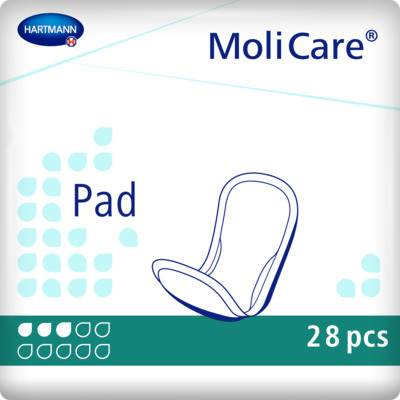
MoliCare Pad 3 Drops
<h2>Suitable for men and women</h2> <p>Protect yourself against slight bladder weakness with the MoliCare® Pad 3 drops. Suitable for men and women, offering an ideal solution to regain control and live your active life without interruptions. Slimline, discreet, and contoured to fit your body, these pads ensure a comfortable and barely noticeable feel, providing exceptional dryness and protection for slight incontinence.</p> <p>Crafted with soft, skin-friendly fabric and a polyester backsheet, these pads ensure you can confidently go about your day, secure against minor leaks. The wide adhesive fixing strip keeps the pad securely in place, while the super absorbent core wicks moisture away from your skin. The elastic anti-leak edging adds an extra layer of reassurance, and odour neutraliser keeps you feeling fresh and confident. With the MoliCare® Pad 3 drops, you no longer need to let slight or occasional incontinence hold you back from enjoying life to the fullest. Simply adhere the pad to your underwear, and you will barely feel the difference.</p> <h2>Unmatched on price</h2> <p>Experience convenience with our fast and discreet delivery service, bringing your chosen products directly to your door. At HARTMANN Direct, we offer a price match promise and free delivery for orders over £40, making sure you receive both quality and value.</p> <p>If you need further assistance, our customer care team is here to help. Give us a call today at 0800 028 9470, and we'll find the perfect incontinence product tailored to your needs. Take charge of your life with the reliable and comfortable protection of MoliCare® Pad 3 drops. Say goodbye to worries and hello to an active and confident lifestyle.</p> <p> </p>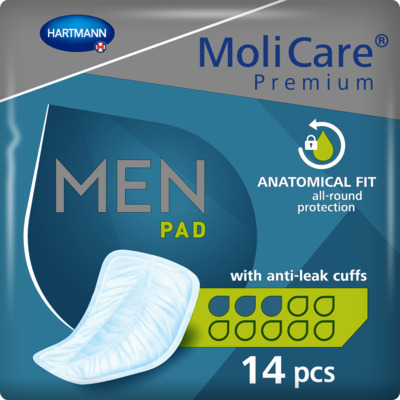
MoliCare® Premium Men Pad 3 Drops
<h2>Suitable for all men</h2> <p>Suitable for men of all age groups, body shapes and sizes, it truly is a one size fits all with this range. It is never pleasant to go about daily activities with the potential risk of an incontinence slip, MoliCare® have created the Premium Men Pad 3 drops, designed with a V-Shape to comfortably fit around the desired area, and has a textile-like back sheet for extra protection.</p> <p>To make sure that you choose a premium men pad that is right for you, check out the additional features of this product range:</p> <h2>Designed for Comfort and Confidence</h2> <p>With a body-shaped design, these absorbent pads offer reliable protection for men with light bladder weakness. The soft, cotton-like materials ensure discreet comfort, and the odour neutraliser keeps you feeling fresh and confident.</p> <h2>Secure and Skin-Friendly</h2> <p>The Premium MEN Pads feature a wide adhesive strip for secure fixation in your regular underwear, providing you with peace of mind during your daily activities. The soft and breathable materials are gentle on your skin, maintaining its health with a skin-friendly pH.</p> <h2>All-Round Protection</h2> <p>MoliCare® Premium MEN Pads are equipped with a quick dry system, anti-leakage system, and cuffs for added security, ensuring all-round protection you can trust. Dermatologically tested, these pads are safe and reliable for daily use.</p> <h2>Tailored for Your Needs</h2> <p>Available in different absorbency levels, MoliCare® incontinence products cater to varying degrees of incontinence, providing you with the level of care that suits your needs. MoliCare® Premium MEN Pads are perfect for daily wear or when you need extra protection against slight to moderate incontinence. Discreet and comfortable, they enable you to maintain your active lifestyle with confidence.</p> <h2>Discreet and Reliable Delivery</h2> <p>Our quick ordering service makes it easy to get the incontinence products you need. Additionally, our price match promise ensures you get both quality and value for money.</p> <p>Enjoy fast and discreet delivery on all orders over £40 when you purchase from HARTMANN Direct.</p>